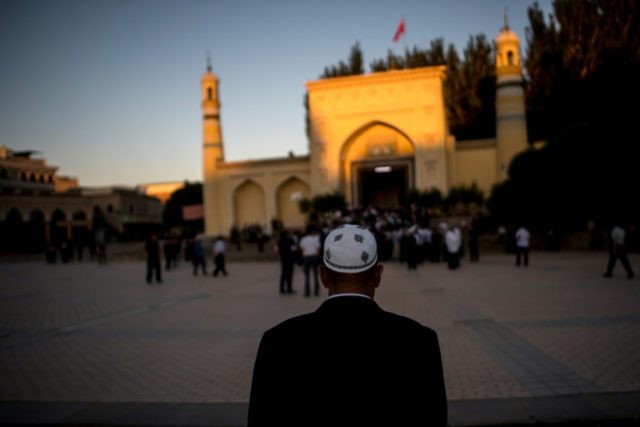China’s state-run Global Times boasted on Wednesday of a dramatically improved security situation in the province of Xinjiang, where the brutally oppressed Muslim Uighurs dwell. Apparently, the proliferation of re-education camps is making Xinjiang safe for tourism again.
The Global Times did not linger on the unpleasant details of how many Uighurs now live in state-provided domiciles they are not at liberty to leave, or what sort of treatment they receive from their jailers. Instead, it argued tighter security was needed after “several deadly attacks in 2014,” which scared off tourists and investors.
The Chinese paper scolded Westerners to get over their hangups about “so-called human rights violations” and appreciate how tossing the Uighurs into camps has improved their economic outlook:
Stability has improved living standards in Xinjiang. Some Western media recently cited so-called “human rights violations” in Xinjiang, ignoring one fact: the right to development is an inalienable human right. Everyone is entitled to participate in and enjoy economic development. With an array of security measures, people’s right to development is being protected as far as possible.
With a booming tourism market, Xinjiang’s economy is recovering. Peace and stability have laid a solid foundation for development, and the next step may be further opening its economy to foreign investors.
As a key area along China’s Belt and Road initiative, Xinjiang is striving to improve its transportation, logistics and communication infrastructure. The region has an advantage in attracting investment from Central Asian nations.
Xinjiang’s economic growth is set to bring positive impetus to the development of China’s neighboring countries such as Kazakhstan and Pakistan. Social stability and economic development in Xinjiang are also positive factors in maintaining regional peace and security.
An under-appreciated aspect of the Xinjiang crisis is that China’s most restless province happens to lie at a crucial juncture for the vast international Belt and Road initiative, which aims to recreate the ancient Silk Road trade route through the Middle East. The next stops after Xinjiang are Pakistan and Afghanistan, which are not exactly placid. The Chinese are not exaggerating when they talk about terrorist attacks in the area, which killed almost 500 people between 2010 and 2014.
A Bloomberg News op-ed in August warned China that it might damage its Belt and Road aspirations by coming down too hard on the Uighurs and alienating other Muslim constituencies for its grand endeavor:
Trade is more than a few sealed trucks rolling up to a checkpoint set amid walls and barbed wire. Trade cannot happen without people – without the coming and going of traders, without bustling border cities and entrepots where deals are made and demand is weighed.
Perhaps China’s planners imagine that Xinjiang need be nothing but usefully located real estate, a barren land through which trains will thunder, shipping their products west. That is, however, unlikely to happen. For one, Xinjiang does not stand in isolation. Many of its people are part of a larger Central Asian cultural network. The case of an ethnically Kazakh Chinese woman who fled after working in one of the camps, for instance, has become a cause célèbre in Kazakhstan.
The government in Astana is already having to deal with increasing popular anger about the Xinjiang crackdown and is quietly complaining to China. The louder the discontent at home, the less polite its complaints will be. Do Chinese leaders imagine that the Belt and Road can be laid down without the cooperation of Central Asia’s governments or of its people?
Contrary to the Global Times’ portrayal of human-rights concerns as a racket devised by China’s enemies to thwart its ambitions, a growing number of outside observers view the Xinjiang crackdown as a horror ranging from Orwellian surveillance dystopia to cultural genocide. They might just go so far overboard against the Uighurs – and other religions targeted in a rapidly expanding crackdown – that every civilized nation grows uneasy about doing business with Beijing.

COMMENTS
Please let us know if you're having issues with commenting.